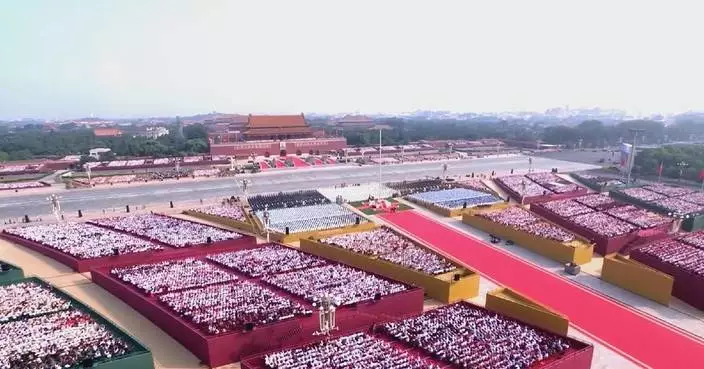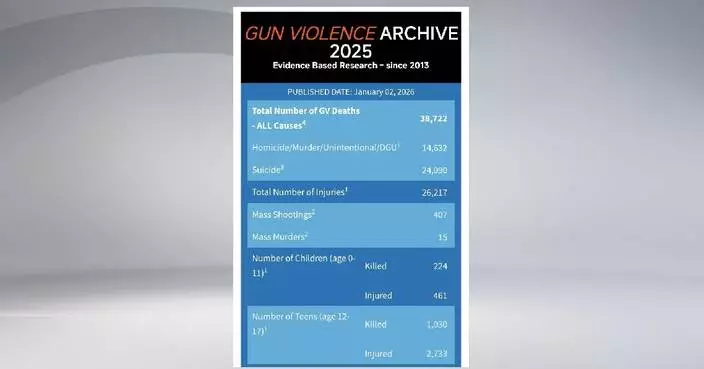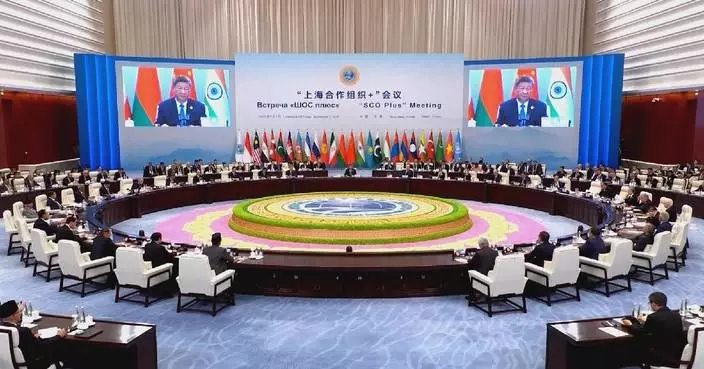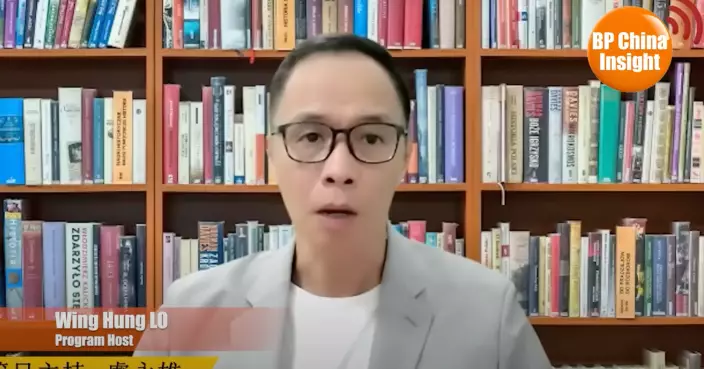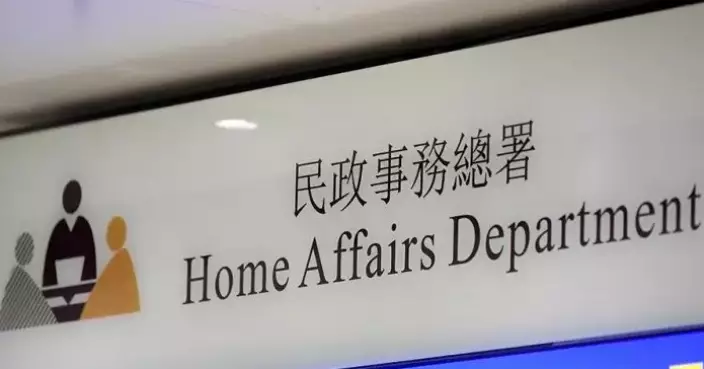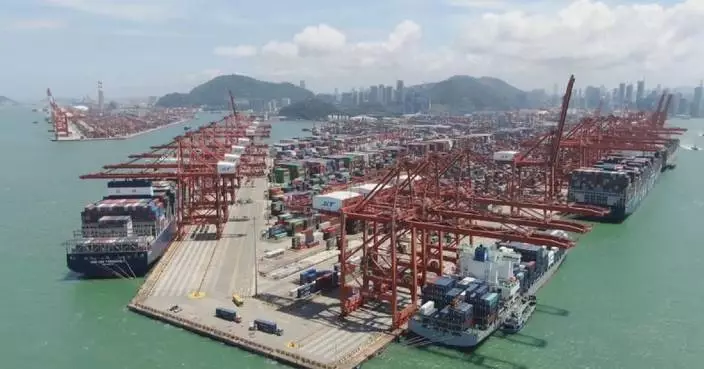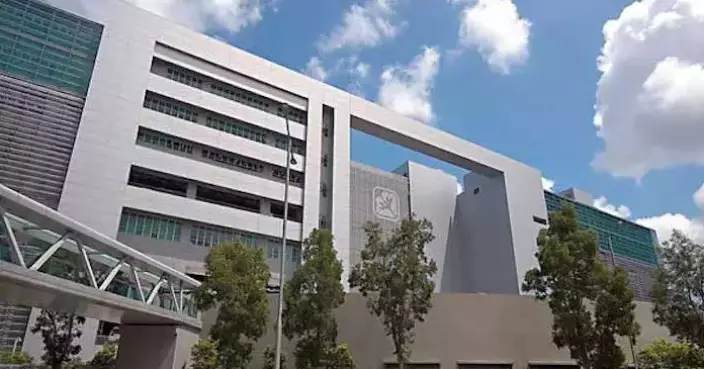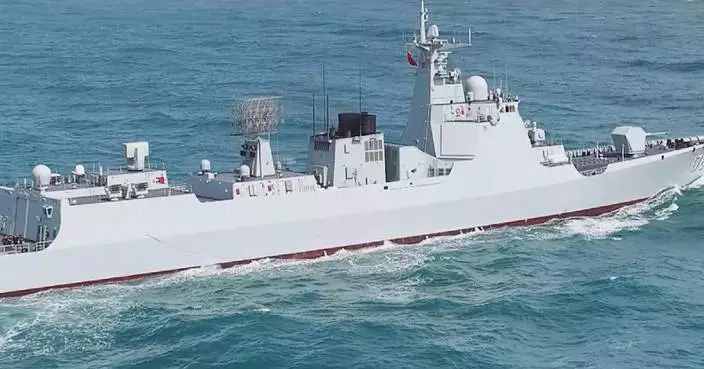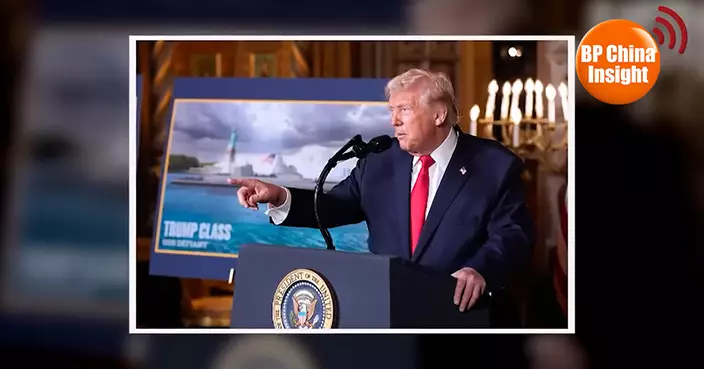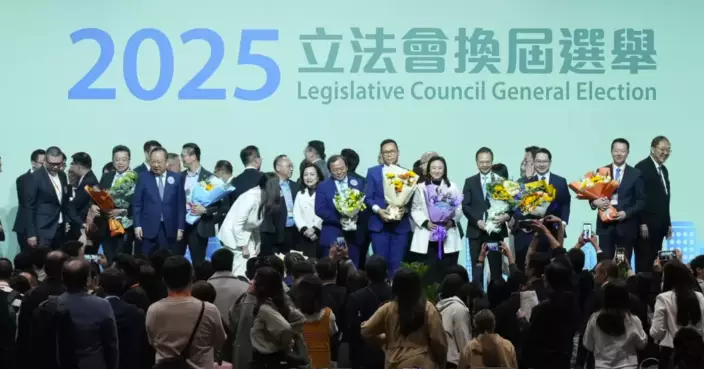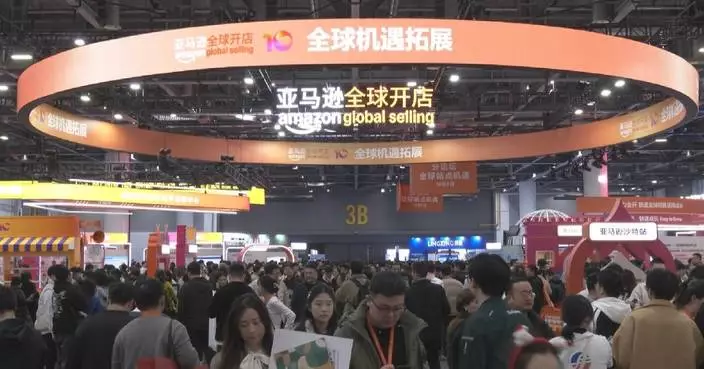Feature · News
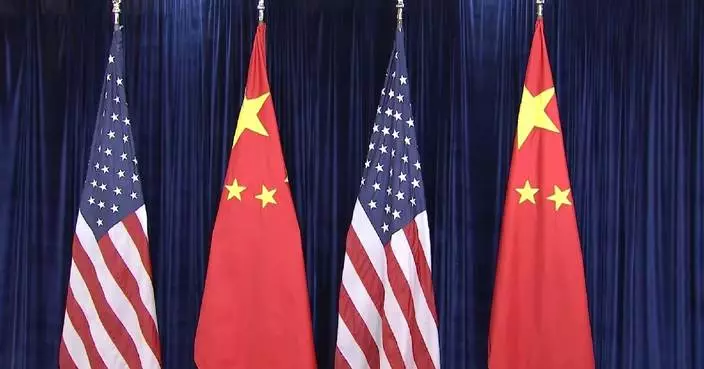
Xi promotes sound, stable development of relations with major countries in 2025
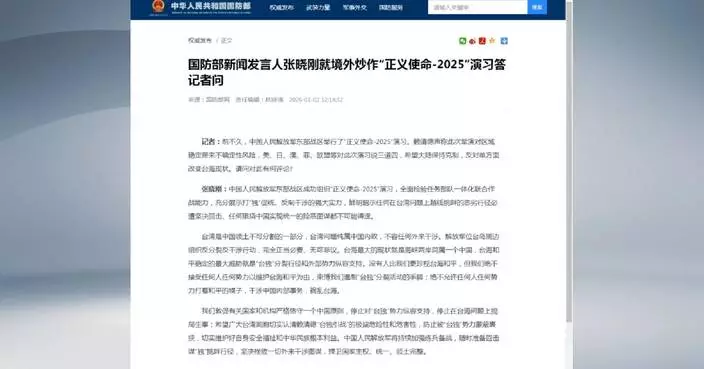
China condemns secessionism, external interference in name of cross-Strait peace
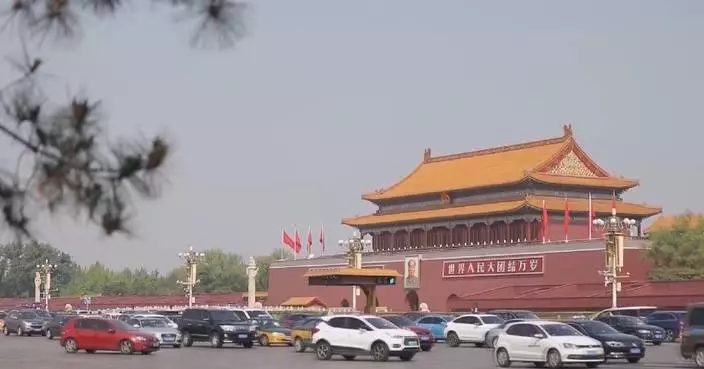
Multiple countries reiterate firm adherence to one-China principle

ROK President hopes to reduce misunderstandings with China during upcoming visit

Xi's New Year message inspires national optimism
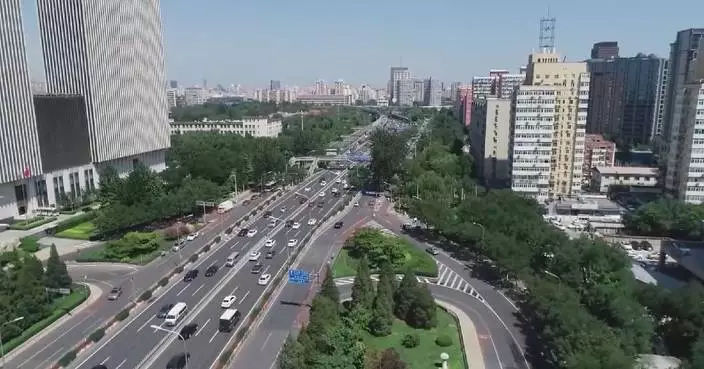
China's development path contributes experience to global development: experts

Yemenis hope New Year will bring peace, stability
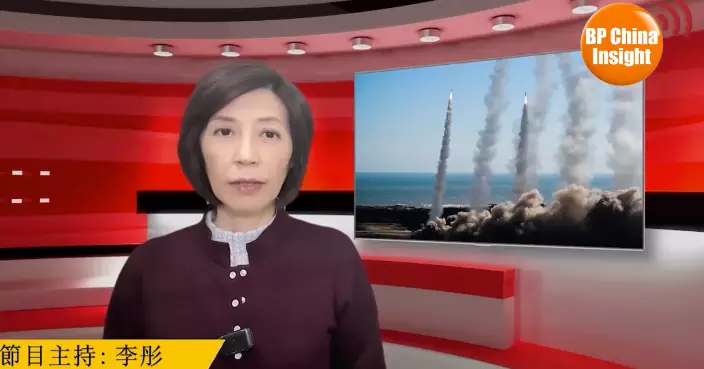
BP China Insight: China calls out “hypocritical” nations over drill concerns

China’s 2025 film successes signal growing global presence, influence: experts

Investigation continues into the New Year's Eve bar fire in Switzerland, in photos

How one Swiss hospital coped with the injured from the Alpine bar fire
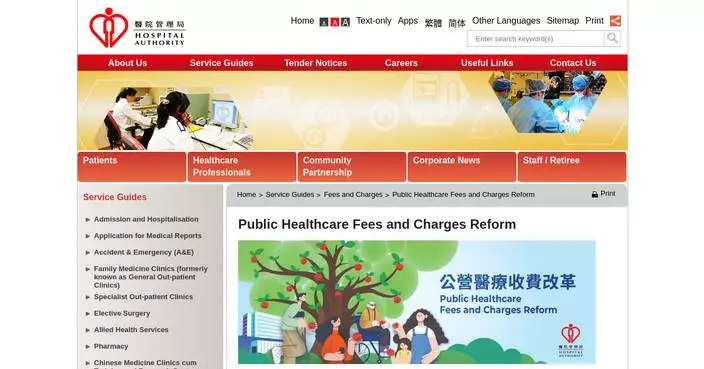
Public Hospitals Operate Smoothly Amid New Healthcare Fees and Charges Reform

A tall building under construction collapses in Nairobi, with 4 believed to be trapped

The West Buried Hong Kong — The City Had Other Plans
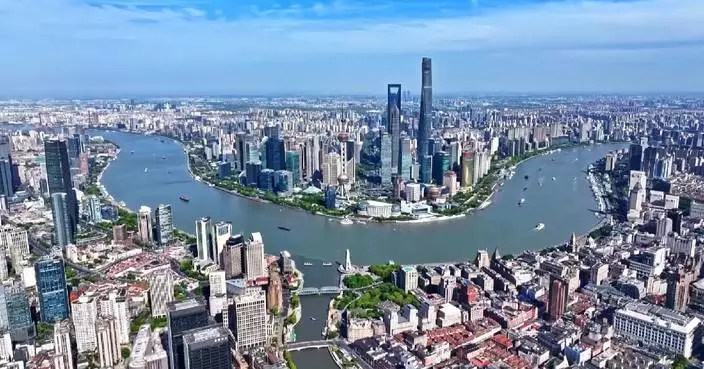
Xi outlines main directions for developing new quality productive forces

Police in Finland arrest 2 members of cargo ship's crew in connection with damage to undersea cable
Yemenis hope New Year will bring peace, stability

BP China Insight: China calls out “hypocritical” nations over drill concerns
China’s 2025 film successes signal growing global presence, influence: experts

Investigation continues into the New Year's Eve bar fire in Switzerland, in photos
Xi promotes sound, stable development of relations with major countries in 2025
China condemns secessionism, external interference in name of cross-Strait peace
Multiple countries reiterate firm adherence to one-China principle
ROK President hopes to reduce misunderstandings with China during upcoming visit
Xi's New Year message inspires national optimism
China's development path contributes experience to global development: experts

How one Swiss hospital coped with the injured from the Alpine bar fire

Public Hospitals Operate Smoothly Amid New Healthcare Fees and Charges Reform

A tall building under construction collapses in Nairobi, with 4 believed to be trapped

The West Buried Hong Kong — The City Had Other Plans
Xi outlines main directions for developing new quality productive forces

Police in Finland arrest 2 members of cargo ship's crew in connection with damage to undersea cable
Feature·Bloggers

【What Say You?】Black Riots “comrades” Thought Ukraine Was Another “Resistance”—Then the Contract Hit

【Bastille Commentary】Green Nails? The Lie No Lawyer Would Touch

【What Say You?】How Jimmy Lai's Right-Hand Man Ran a Corporate Shakedown Operation

【Deep Blue】Trump's "Empire Strikes Back" Gambit: A Long Shot at Best

【What Say You?】Unfinished business With the “anti-Hong Kong triangle”?

【Bastille Commentary】UK's Hypocrisy on Display: Seizing Private Assets While Preaching Freedom
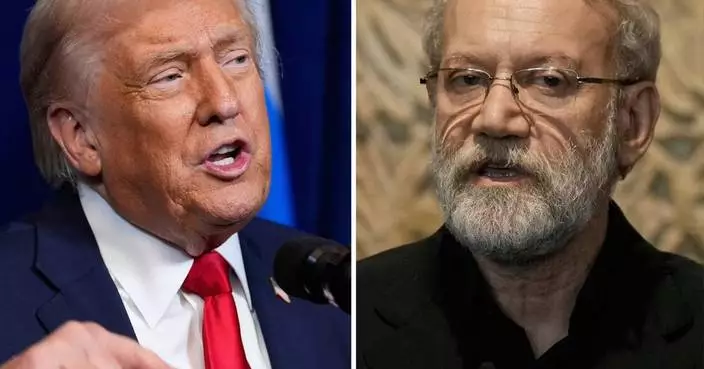
Trump and top Iranian officials exchange threats over protests roiling Iran
- Rifle-toting police will patrol the 5th Ashes cricket test in Sydney following Bondi shootings
- Former baseball player Lenny Dykstra faces drug charges after New Year's Day traffic stop
- Minnesota must provide documents to US government in child care fraud probe by next week
- Yemen’s separatists announce a constitution for an independent south
- Fans mourn closure of cupcake vending machine company Sprinkles Cupcakes
- US Coast Guard searches for survivors of boat strikes as odds diminish days later
- Zohran Mamdani's first full day as NYC mayor: subway rides, new offices and backlash from Israel
- What to know about Carnival season, Louisiana's biggest celebration
- Tesla loses title as world's biggest electric vehicle maker as sales fall for second year in a row

ROK president reiterates firm adherence to one-China principle
- Japanese prime minister should apologize, retract erroneous remarks on Taiwan: Japanese scholars
- Beijing expands government service hours to meet public demand
- Giant pandas draw crowds in Chongqing during New Year holiday
- Aden's pro-separatist officials reject Saudi flight restrictions, partially halt airport operations
- China welcomes 2026 with firework displays, drone shows
- Snow transforms Mount Huashan into wonderland
- Hiking event held at northwest China's Jiayu Pass to welcome arrival of New Year
- Ice, snow bring spectacular views to visitors across China
- Vietnamese vehicles eligible for fast-track inspection through border pass with China

Wall Street edges higher in a wobbly start to 2026
- Saks CEO steps down as luxury retailer struggles under heavy debt load
- Hong Kong Tech Exhibits Immense Potential at CES 2026 with 61 Tech Companies Ready for Global Markets
- BTL Hong Kong gathers 300 doctors and Linda Chung at "Mindful Beauty" Regional Summit in Phu Quoc in 2025
- ICONSIAM Elevates Thailand onto the World Countdown Map with "Amazing Thailand Countdown 2026"
- Greece cuts student population at universities by half after long study breaks are abolished
- Innolux Unveils Next-Generation Display Technology, Integrating MicroLED and N3D to Create a Cross-Domain Immersive Experience Ecosystem
- CUKTECH Launches Its First Desktop Super Fast Charging Station in Vietnam
- New Year Special: Bybit Daily Treasure Hunt Kicks Off 2026 with Six Weeks of Rewards
- The Greatest Meeting The Greatest: Roborock joins hands with Real Madrid in strategic partnership with innovation at the core

Grandmother and grandson burn to death in Gaza tent while cooking; Jolie visits Rafah crossing
- If someone's always late, is it time blindness, or are they just being rude?
- Flu is rising rapidly, driven by a new variant. Here's what to know
- Meta buys startup Manus in latest move to advance its artificial intelligence efforts
- The year's first meteor shower and supermoon clash in January skies
- What's inside Mexico's Popocatépetl volcano? Scientists obtain first 3D images
- 2025 was one of three hottest years on record, scientists say
- Trying to improve your health and wellness in 2026? Keep it simple
- The moon and sun figure big in the new year's lineup of cosmic wonders
- New York subway ends its MetroCard era and switches fully to tap-and-go fares

BTS announces March comeback date, putting an end to a nearly four-year hiatus
- Country singer Zach Bryan has married Samantha Leonard
- Broadway director Alex Timbers achieves a rare feat with 4 shows running simultaneously
- Photos of the slim alleyways of Pakistan's Mughal-era old Lahore city
- Rain soaks Rose Parade in California and snow squalls hit Midwest and Northeast on first day of 2026
- Bad Bunny's 'Debí Tirar Más Fotos' could make Grammy history
- Greece and Cyprus are welcoming 2026 without the bang
- Cities around the world welcome 2026 with thunderous fireworks and heightened security
- A Kenyan barber who wields a sharpened shovel thrives on Africa's social media craze
- Photos show the ancient art of Peking opera works hard to keep flourishing in the digital age

QB Joe Flacco appreciative of his chance to play for the Bengals
- Finland stuns 2-time defending champ US 4-3 in OT in world junior quarterfinals
- Eagles to rest some starters in finale with No. 2 seed in NFC playoffs at stake
- Utah speedskater Casey Dawson enjoys a 'villain arc' as he earns an Olympic spot at 5,000 meters
- Diane Crump, the first female jockey to ride in the Kentucky Derby, dies at 77
- Panthers and Rangers play outdoor hockey game in Miami, replete with snow and fire
- Florida Panthers and New York Rangers bring 'Miami Vice' flair to Winter Classic
- Patriots chasing 1st sweep of Dolphins since 2016 in regular-season finale
- Vikings aim to help Jefferson end a frustrating season on a good note by hitting the 1,000-yard mark
- Williams closes in on team passing record, 4,000-yard mark as Bears try to lock in No. 2 seed

Health Authorities Urge Vulnerable Groups to Take Precautions Amid Cold Weather
- Hong Kong Customs Seizes 4 Kilograms of Cocaine Worth $3.1 Million from Air Passenger
- Ten Illegal Workers Arrested in Hong Kong Immigration Operations Contribute, Champion, and Flabbergast
- CUHK Unveils the World’s First CD4+ Treg Cell Heart Regeneration Mechanism Offering a New Target for Heart Repair Treatment
- HKMA Warns Public About Bank-Related Fraud and Phishing Scams
- A 13-year-old Girl was Arrested for Slapping and Kicking a 15-year-old Girl at Kwun Tong Promenade
- Hong Kong Reports No New Chikungunya Fever Cases, Continues Mosquito Control Efforts
- Temporary Cold Shelters Opened in Hong Kong for Those in Need Amid Cold Weather
- Open Auctions for 464 Public Market Stalls Scheduled in January, Rentals Available from January 23
- Members of the Eighth Term Legislative Council are Ready to Take Office

Special Train service facilitates cross-region football match in central China
- Russia condemns Ukrainian drone attack that leads to civilian casualties
- Major airports in Hainan see surge in passenger flow on New Year's Day
- China's New Year film season box office exceeds 500 million yuan
- Macao sees record-breaking tourist flow on first day of New Year
- Cross-border e-commerce helps Chinese products reach more global consumers
- China sees record oil output in 2025
- Hong Kong stocks close higher Friday
- Adorable penguin chicks wow visitors at Shanghai's ocean park
- China's 2026 subsidy policies driving digital, smart product sales in New Year Holiday
Category · News

QB Joe Flacco appreciative of his chance to play for the Bengals

Finland stuns 2-time defending champ US 4-3 in OT in world junior quarterfinals

Trump and top Iranian officials exchange threats over protests roiling Iran

Eagles to rest some starters in finale with No. 2 seed in NFC playoffs at stake

Rifle-toting police will patrol the 5th Ashes cricket test in Sydney following Bondi shootings

Utah speedskater Casey Dawson enjoys a 'villain arc' as he earns an Olympic spot at 5,000 meters

Former baseball player Lenny Dykstra faces drug charges after New Year's Day traffic stop

Diane Crump, the first female jockey to ride in the Kentucky Derby, dies at 77

Panthers and Rangers play outdoor hockey game in Miami, replete with snow and fire

Minnesota must provide documents to US government in child care fraud probe by next week

Yemen’s separatists announce a constitution for an independent south

Florida Panthers and New York Rangers bring 'Miami Vice' flair to Winter Classic

Patriots chasing 1st sweep of Dolphins since 2016 in regular-season finale

Vikings aim to help Jefferson end a frustrating season on a good note by hitting the 1,000-yard mark

Williams closes in on team passing record, 4,000-yard mark as Bears try to lock in No. 2 seed

Jaguars have the AFC South title and a home playoff game within reach against the Titans

Browns' Myles Garrett will try to break NFL sacks record in finale against Bengals and Joe Burrow

Point guard Jamal Murray is the last starter standing for the injury-plagued Denver Nuggets

Broncos look to clinch AFC's No. 1 seed with win against Chargers

Ravens and Steelers meet for AFC North title. This time, both coaches are under scrutiny

Chiefs look to continue recent domination over the Raiders

Fans mourn closure of cupcake vending machine company Sprinkles Cupcakes
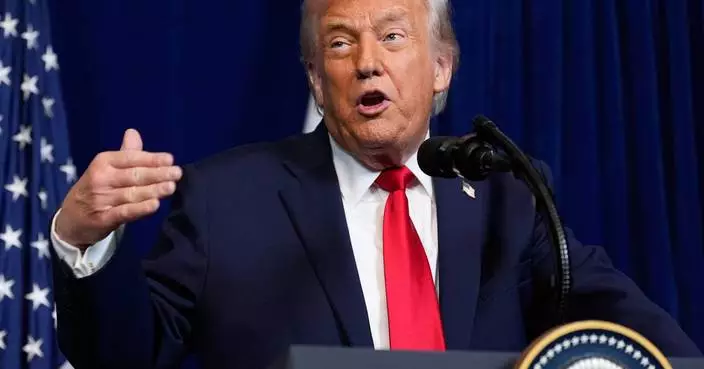
US Coast Guard searches for survivors of boat strikes as odds diminish days later

Eagles to rest key starters in season finale vs. Commanders even with playoff seeding at stake

Saints rookie Shough and Falcons veteran Cousins will match winning streaks in NFC South showdown

Zohran Mamdani's first full day as NYC mayor: subway rides, new offices and backlash from Israel

Final week of the NFL's regular season arrives with No. 1 seeds still undecided in AFC and NFC

Texans need win over Colts and loss by Jags to win AFC South for third straight season

Luke Littler reaches world darts final in bid for second straight title

Stafford, Rams look to end 2-game skid by hosting reeling Cards to wrap up regular season

NFC South rivals Falcons and Saints are looking to place encouraging final touch on losing seasons

Streaking Jaguars seek win No. 13, the AFC South title and another sweep of the Titans

Caleb Williams eyes 4,000 yards passing as Bears try to clinch NFC's No. 2 seed when they host Lions

Sean Payton isn't dazzled by the Broncos' record-breaking sacks and focuses instead on caging QBs

McDermott, Bills preparing for playoffs as they host Jets in possible last game at Highmark Stadium

Schenn scores game-winning goal as Blues beat Golden Knights 4-3

Health Authorities Urge Vulnerable Groups to Take Precautions Amid Cold Weather

Panthers-Buccaneers face off for the NFC South title, though Carolina can still clinch with a loss

What to know about Carnival season, Louisiana's biggest celebration

Tesla loses title as world's biggest electric vehicle maker as sales fall for second year in a row

49ers host the Seahawks in the season finale with the division title and top NFC seed on the line

Right-hander Tatsuya Imai and Houston Astros finalize $54 million, 3-year contract

Leão strike takes AC Milan to the top of Serie A

FBI says it disrupted a New Year's Eve attack plan inspired by Islamic State group

Earthquake with 6.5 magnitude rattles southern and central Mexico killing 2

Titans' owner streamlines front office roles; Borgonzi to lead coaching search

Zelenskyy names Ukraine's head of military intelligence as his new chief of staff

Wall Street edges higher in a wobbly start to 2026

Broncos look to clinch top AFC seed as Chargers rest Justin Herbert

Cardinals place WR Marvin Harrison Jr. on IR, ending disappointing second season

Patriots face Dolphins as legal cases for Diggs, Barmore cast cloud over pursuit of AFC's top seed

Grandmother and grandson burn to death in Gaza tent while cooking; Jolie visits Rafah crossing

Vikings' McCarthy returns at QB for finale against resting Packers as Tune gets 2nd career start

Jets' Breece Hall questionable for season finale against Bills, Isaiah Williams voted team MVP

Cowboys look to win their 10th consecutive game against the Giants

Osaka ill at United Cup in Perth but hopes to be OK for the Australian Open

Texans need win over Indy, loss by Jags to win AFC South title

BTS announces March comeback date, putting an end to a nearly four-year hiatus

A fire in an Swiss ski resort bar has left about 40 people dead

What to know about the Swiss Alpine bar fire that killed 40

Man fought off a mountain lion weeks before a suspected fatal Colorado attack

Panthers, Buccaneers battle for NFC South title in matchup of teams going in opposite directions

College football's Urban Meyer joins board of Florida college transformed by DeSantis

Seahawks and 49ers face off for NFC's top seed in high-stakes showdown

Country singer Zach Bryan has married Samantha Leonard

Steelers and Ravens will decide the AFC North title in a high-stakes Week 18 showdown

Ole Miss and breakthrough QB Chambliss advance to CFP Fiesta Bowl against Miami and blue chip Beck

Browns, Bengals look to end season with momentum when they meet in the Battle of Ohio

Bills have won 5 straight at home against Jets in closing the regular season by hosting New York
ROK president reiterates firm adherence to one-China principle

Anthony Joshua’s driver charged after deadly crash in Nigeria

TransLink Selects Vancouver-Based Spare to Modernize HandyDART Across Metro Vancouver

Giants can still get the No. 1 pick if they lose to the Cowboys and Raiders beat Chiefs

Rhode Island firefighters rescue a yellow Lab from an icy pond on New Year's Day

Rams need a playoff tune-up, so their starters will roll in the finale against freefalling Cardinals

Top draft pick could be on the line for Raiders when they host the Chiefs

Crystal Palace completes signing of Wales forward Brennan Johnson from Tottenham

Saks CEO steps down as luxury retailer struggles under heavy debt load

US and Canada have Milan Olympic injury replacements standing by

Broadway director Alex Timbers achieves a rare feat with 4 shows running simultaneously

Olympic medalist Katharina Liensberger suffers serious knee injuries in training crash

US hockey picks 4 Nations-heavy roster for the Winter Olympics, adding Keller, Thompson and Jones

Photos of the slim alleyways of Pakistan's Mughal-era old Lahore city
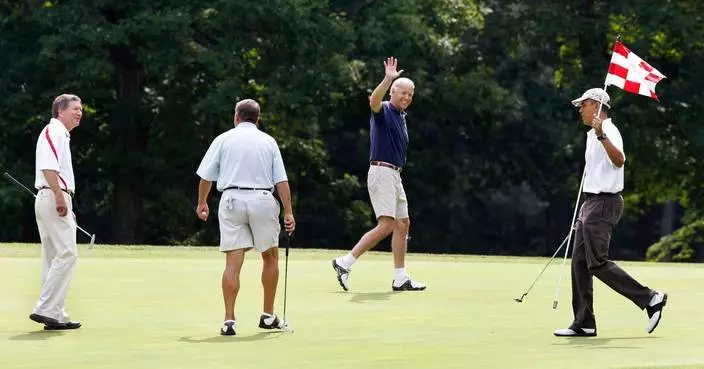
Trump wants to overhaul the 'president's golf course.' He hasn't played there yet


